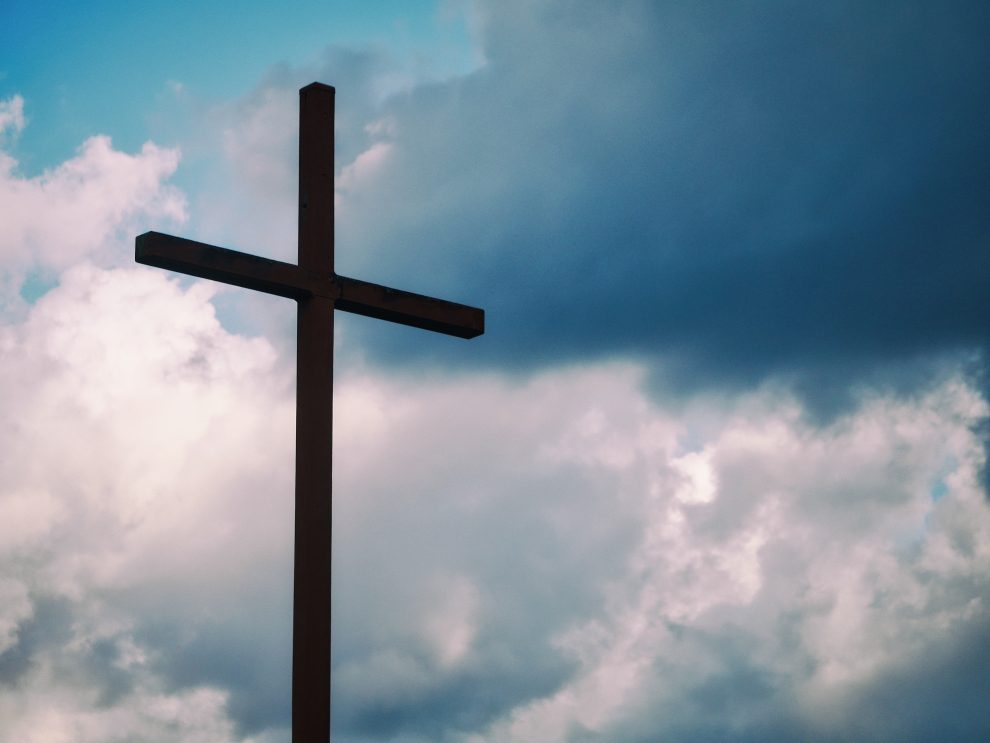The final words of a dying person are precious to those left behind. When time is short, one has a chance to speak only of the most important things—love, forgiveness, faith. The last words are often the summation of a life, cherished and pondered long after the loved one has died. The final testament of a human life can be known in these words.
That is why the church has a long tradition of meditating on the last words of Jesus from the cross. The blending of these sayings from all four gospels became part of the church’s Lenten tradition. The Seven Words have been set to music, used in sacred dramas, and pondered in Good Friday observances in churches around the world. In this last testament of Jesus, all Christians find a pearl of great price.
—Alice Camille
“Father, forgive them, for they do not know what they are doing.”
—Mary Gonzales
When they came to the place that is called The Skull, they crucified Jesus there with the criminals, one on his right and one on his left. Then Jesus said, “Father, forgive them; for they do not know what they are doing.” And they cast lots to divide his clothing. (Luke 23:33–34)
These words, spoken at this moment, are perhaps the most profound revelation of God’s love for us—for us human beings.
It is in this moment—suffering, betrayed, spat upon, reviled, made a laughing stock; nails driven through flesh, bones and tendons; a failure to friends, family, and foes—that Jesus utters this utterly unimaginable statement.
These are not the words of a person scourged and humiliated. These are the words of a strong mother protecting a small child from a stern father. These are the words of a loving father protecting a son from a righteous judge. These are words of unquestioning and unqualified love for others.
How can Jesus love his tormentors in this manner? He looks past their rage; past their foolishness and folly; past their cruelty, brutality, and depravity; past all their ugliness, and sees a humanness worthy of love.
What a rebuke to those of us who cannot see humanness past a person’s color, past a person’s ethnic origin, past a person’s gender, past a person’s lifestyle, past a person’s disability. How far we are as parents, as spouses, as citizens, as a country from loving in the Jesus way.
“Truly I tell you, today you will be with me in Paradise.”
—Peter J. Gomes
Then [the criminal] said, “Jesus, remember me when you come into your kingdom.” He replied, “Truly I tell you, today you will be with me in Paradise.” (Luke 23:42–43)
I am notorious for getting lost while driving, and for not asking for directions—a man thing, I have been told. I may be lost, but I always know where I am. It is where I am going that is the problem.
The thief on the cross knew where he was. He was on the cross, hanging there as the just reward for his deeds. He did not offer alibi or apology. He did not explain himself a victim of circumstances. He was what he was, he knew what he was, and he knew where he was. He was, you might say, past all illusions.
His coconspirator understood that, and with an irreverence that shocks even now, he mocked Jesus with the cry we all know and use: “If you’re so smart, how come you’re up here with us?”
These crucified felons are not uninformed. They know who Jesus is supposed to be. They had heard of his mighty wonder-working. Perhaps they had even heard of his raising Lazarus from the dead. Compared to that, getting them all down from the cross would be a piece of cake: “If thou art the Christ, save thyself, and us, then.” Don’t just stand there. Do something!
They know where they are, but that “good thief” is like you and like me. He’s lost, not because he doesn’t know where he is. He’s lost because he doesn’t know where he is going. So—very much unlike me, at least—he stops and asks for directions: “Lord, remember me when you come into your kingly power.”
This is an act of faith: He places himself in the care of one who would appear to be no better off than he and asks to be delivered to a place of kingly power the very thought of which is mocked by the reality of the cross itself. He can see beyond that, he has what we call insight, a light that transcends what one can literally see. He moves not by sight, but by faith.
It seems too good to be true, too uncomplicated. But at death’s door, things get pretty simple, pretty clear, pretty uncomplicated. The words belong to Jesus, but the future belongs to the thief, and for that we praise God.
“Woman, here is your son. Here is your mother.”
—Gregory Dell
When Jesus saw his mother and the disciple whom he loved standing beside her, he said to his mother, “Woman, here is your son.” Then he said to the disciple, “Here is your mother.” And from that hour the disciple took her into his own home. (John 19:26–27)
The 18-year-old young man already had attempted suicide twice. The torment and isolation were simply too great. Now, away from home for the first time, he wrote the careful letter to his parents. “Dear Mom and Dad. There is no easy way to say this. I am gay—what you call homosexual. I need your help and love. Who else could understand me?”
He waited. Five days later the envelope came. With fear on the edge of terror and hope that he dared not admit, he opened the paper and found its only contents: his birth certificate torn in pieces.
The word of Christ at the moment of his greatest agony was a radical word of love and grace.
His message: “You belong to a family that not even death can destroy. Earthly fear or ignorance, weakness or bigotry or even violence may tear into pieces the world’s affirmation of your value and goodness. But I say to you, there is a God who surrounds you with the true love of a mother and the faithfulness of a true child.
“That love and faithfulness may not be where you had hoped or yearned. But it is there. I give it to you—without conditions.
“Woman behold your son. Son or daughter, behold your mother.”
“My God, my God, why have you forsaken me?”
—Martin E. Marty
From noon on, darkness came over the whole land until 3 in the afternoon. And about three o’clock, Jesus cried with a loud voice, “Eli, Eli, lema sabachthani?” that is, “My God, my God, why have you forsaken me?” (Matt. 27:45–46)
That is a cry of abandonment. Many believers since have tried to explain it away by saying that Jesus was only quoting Psalm 22, which ends on a note of confidence. No, that doesn’t work.
This quoted cry became his own statement of his own condition, in that eerie darkness of that afternoon. He may have been ready for an innocent death, he was sure of his purpose, but in that pain, and in that chaos, and in that hour, he had nothing left but a cry of godforsakenness.
That cry, of course, belongs to the larger plot of the gospel story, of faith in Jesus and the one he called Eli—my God. If he had not felt abandoned, his dying would have been only an uncomfortable charade on the way to a resurrection.
Here instead is the note of realism that has led believers ever since to have confidence that he was the last one who needed to feel utterly abandoned by God. In their view, full of faith, thanks to the love he showed the world, he effected a new relation to God. And so they are confident that they will live and die in divine company—never forsaken as he felt he was and, at that moment, as he truly was.
“I thirst.”
—John Shea
After this, when Jesus knew that all was now finished, he said (in order to fulfill the scripture), “I thirst.” A jar full of sour wine was standing there. So they put a sponge full of the wine on a branch of hyssop and held it to his mouth. (John 19:28–29)
“I thirst,” Jesus said.
It was not the first time. Once before in John’s gospel he thirsted.
“Give me a drink,” he asked the Samaritan woman. But by the end he had given her a drink and told his disciples that his food and drink was to do the will of his Father. And the will of the divine source is to connect all there is to divine love.
And so he thirsts to make that connection, to be that channel, to become a flow of grace to every moment of crucifixion. His thirst is to become water to our parched throats, wine to the failing weddings of our lives.
When we are at our end, when our resources seem depleted, when our energies are wasted, when our opportunities are gone, when we reach in the air for we know not what, then he cries again, “I thirst.”
And his unquenched thirst brings him to us. We are no longer alone. The connection is made, the channel is open.
Love, invisible yet real, flows. Until the end of history he cries “I thirst,” and becomes the companion of every emptiness, the secret fullness of every lack, brother to our suffering, peace in our pain, love where least expected.
“It is finished.”
—Andrew M. Greeley
When Jesus had received the wine, he said, “It is finished.” Then he bowed his head and gave up his spirit. (John 19:30)
There comes a time when we must let go. We must give up being a baby to become a kid. We must abandon being a kid so that we might be a teen. We must relinquish high school so that we can go to college. We must some day eventually stop being a student and get a job.
We must give up the freedom of the single state to marry, to adjust to a spouse, and then to adjust to children. We must some day permit the children to be free so that they can be adults on their terms, not ours. We must give up health and perhaps independence as we grow older. Eventually we must give up life itself.
At each of these times of surrender in our lives we must trust. We must trust God, other human beings, and ourselves. Dying is not only the end of living; it is part of living. Each new yielding opens up the possibility of something new that is both frightening and appealing. We have no choice in the matter.
Every day we must yield our spirit to graces. We can do so stubbornly, reluctantly, with protests and complaints. We can curse the dimming of the light. Or we can go gracefully into the night as Jesus did, firm in the knowledge that it is safe to say, “It is finished.”
“Father, into your hands I commend my spirit.”
—Alison Boden
Then Jesus, crying with a loud voice, said, “Father, into your hands I commend my spirit.” Having said this, he breathed his last. (Luke 23:46)
These were the last words of a dying man: Into your hands, gracious God, I place my spirit. They were the words of a man dying not of disease or accident, but premeditated murder, execution. Betrayed, convicted on the flimsiest of evidence, abandoned by his friends, and left absolutely alone—under such circumstances, how did he dare to say, “Into your hands I commend my spirit”?
I think it was possible for him only because he had been saying it every day of his life. Jesus had trusted God with his very spirit every day that he had drawn breath.
When the crowds around him were growing and were adoring, when everyone in the region wanted just to touch the fringe of his cloak, he placed all of himself in the hands of God.
When the people of his own hometown, the folks he’d grown up with, who’d known him since he was a boy, wouldn’t accept what he had become and drove him from town in a murderous mob, Jesus placed all of himself in the hands of God.
When his killers circled closer and closer around him in the garden and he prayed to be spared, he placed all of himself in the hands of God.
With his last, suffocating breath on the cross, he knew he could place all of himself in the hands of God.
Good ole Monday, boring lunch meeting; Tuesday, dentist appointment; Wednesday, spreadsheets beyond number; Thursday, challenge from a colleague to a decision painfully arrived at; Friday, fight over breakfast that clouds the day. “Into your hands I commend my spirit.”
Monday, spiritual epiphany in a lunch meeting; Tuesday, noticed first buds on tulip tree; Wednesday, felt the strongest, gentlest, holy accompaniment while walking down the street; Thursday, was privileged to be taken into the deepest confidence of an acquaintance; Friday, figured out that being the perfect lover, parent, student, friend is not possible. “Into your hands I commend my spirit.”
Let us learn from the last words of a dying man that in every minute we live—and in the moment when we will die—the open hands of love are waiting to receive our spirits, waiting to receive the whole of our lives.
This article appeared in the April 2001 issue of U.S. Catholic (Vol. 66, No. 4, page 18).
Photo by Aaron Burden on Unsplash














Add comment